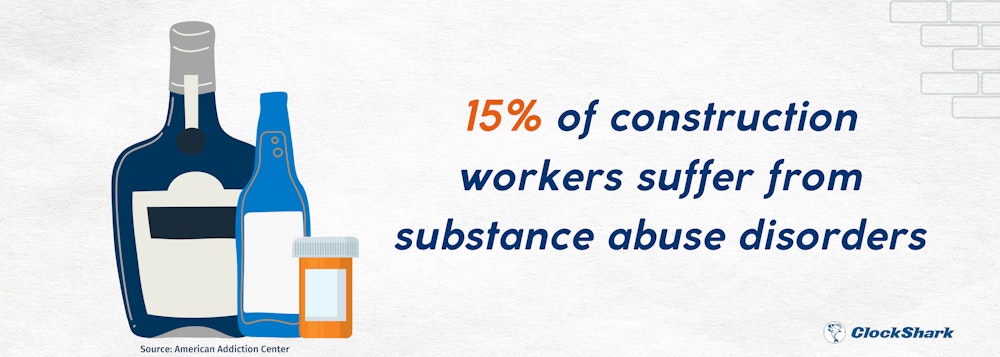The construction industry is one of the toughest in the U.S. when it comes to work and working environments. Employees of construction firms face unique challenges, both physical and mental. While using the right PPE for physical jobs is a part of construction safety, there is not much in the way of mental health protection.
So what can today’s organizations do to create a culture of good mental health in construction?
The Importance of Addressing Mental Health on the Jobsite
Mental health is an important part of your company culture. Not only to promote a healthy and safe place of employment but also to keep your construction workers performing their best.
The Centers for Disease Control (CDC) points out poor mental health issues impact businesses because it affects employees’:
- Job performance and productivity
- Engagement with one’s work
- Communication with coworkers
- Physical capability and daily functioning
Additionally, individuals who suffer from depression have reduced cognitive performance about 35 percent of the time.
This is a particularly important point to address for construction, as construction workers are at a higher-than-average risk for depression and suicide. In fact, a study by CIRP found 83 percent of construction workers experienced “some form of moderate to severe mental health issue.” Their research also revealed 90 percent of workers had “high rates of early childhood trauma” and 70 percent had undiagnosed post-traumatic stress disorder (PTSD).
The national suicide rate in the U.S. is 14.2, with men being four times more likely than women to commit suicide. In construction, that rate jumps more than three times, with an average of 45.3.
These are staggering numbers for construction managers to consider when addressing mental health within their companies. Having a company culture of mental health awareness and support, is more likely to produce healthier, happier employees, which makes their lives better as well as improves their performance on the job.

Mental Health Challenges in Construction
Of course, everyone experiences challenges at work and at home, but the construction industry as a whole, faces unique challenges to their mental health and boasts statistics that make poor mental health more prominent in this field.
Male-Dominated
Perhaps most glaring is the male-dominated nature of the construction industry, and the inherent expectation of “toughness” from today’s men. Men are less likely to seek help for depression or anxiety than women, and men in construction are expected to be even tougher. Men do not generally want to be viewed as “weak” so they tend to keep their feelings bottled up.
Unpredictability
Construction often comes with unpredictable cash flow problems, project disruptions, and work availability. These are among just some things that cause increased stress for construction company leaders and contractors, as well as their workers. Repeated, constant stress results in depression and maladaptive behaviors.
Heavy Workloads
Construction workers are always under the pressure of deadlines, which can become tight and difficult. This increases levels of anxiety and stress and makes it difficult for workers to perform their best.
Substance Abuse
Construction workers - predominantly blue-collar workers - are almost twice as likely (15 percent) as the national average (8.6 percent) to have a substance abuse problem. Drug and alcohol problems in the construction industry create a lot of mental health issues. Further, since construction is such a physically demanding occupation, many workers experience injuries requiring opioids. That’s why the construction industry also boasts almost double the national average for opioid use disorder.
Strategies to Promote Mental Health in the Construction Industry
Although mental health is almost a taboo topic on a construction site, it is an incredibly important topic to address. However, promoting mental health in construction must come from the top down, and be repeatedly reinforced and practiced. Here are some practical ways to promote mental health awareness in your construction company.
1. Establish a Supportive Work Environment
It’s important for leaders to get educated about mental health before working on establishing a supportive work environment. Research has found this to be among the most important steps towards achieving it, rather than simply providing passive mental health assistance programs or hotlines.
Mental health should become a priority, with intentional discussions around the importance of it on the jobsite. Be sure your employees understand your company is a safe place to work, and this includes their mental health. Make sure leads and other supervisors are also well-trained in spotting potential mental health issues, and how to respectfully address them.
Encourage workers to support one another when they are going through tough times, and ensure all workers know your company is a drug-free workplace, with a plan in place to assist anyone who seeks help for a substance abuse problem.
2. Encourage Open Communication
Communication is important when it comes to mental health, but not everyone is comfortable stepping forward to express their problems. Be sure your employees feel comfortable communicating their issues and struggles with you or their supervisors.
Sometimes, the response to someone opening up about a problem, makes people uncomfortable and they may respond with joking or a “stop whining” attitude. Make sure everyone understands the importance of actively listening, and validating the feelings of others.
Once you understand what they’re experiencing, provide them with resources they can use and offer support for them to use those resources.
3. Providing Employee Training and Education
When employees receive training and education around mental health, they’ll be more likely to feel empowered to help their colleagues through rough times, or ask for help for themselves, if needed.
4. Offer Mental Health Resources and Benefits
Many construction workers who need to take a day off due to mental health issues, don’t tell their supervisors that’s why they took it and often, they don’t want to ask for a day off because they don’t want to risk losing their jobs.
However, offering mental health days or flexible hours is an easy way for workers to feel comfortable taking a day off to address their problems. Resources, information, and contacts, should also be readily available and easily accessible to your workers.
Pain management resources are also valuable ways to help employees connect with others, and work through physical pain from the job. This can help mitigate addiction to painkillers.
National Resources Available
Your local area likely has resources available for mental health assistance. Here are some national resources to keep in mind and share with your workers, provided by Construction Safety Week.
- National Suicide Prevention Lifeline: 1-800-273-8255
- Crisis Text Line: Text HOME to 741741 (to connect with a Crisis Counselor)
- Veterans Crisis Line (call, chat, or text) 1-800-273-8255, Press 1
- Mental Health America Tools 2 Thrive Toolkit
- Addressing the Root of the Stress Problem in Construction
- National Safety Council
- Building Resilience: Helping Workers Handle Stress for the Long Haul
- Five Ways Construction Workers Can Deal with Stress and Anxiety
- Toolbox Talks: https://www.constructionworkingminds.org/toolbox
- SPANISH Resources: https://www.constructionworkingminds.org/spanish-home
- “Man Therapy” – self-screen for depression, anxiety, substance use, and anger
- Help Yourself, Help Others Screening
- Construction Industry Alliance for Suicide Prevention
- Construction Working Minds: Suicide Prevention in the Construction Workplace
- National Action Alliance for Suicide Prevention
- National Suicide Prevention Lifeline
- Construction Industry “10 Questions” for industry leaders can be found here
- Construction Industry action steps can be found here
Summary/Conclusion
While OSHA requires rigorous safety protocols for construction companies to keep them physically safe, they don’t necessarily require extensive processes for mental health. It’s important for companies to invest in creating a culture of mental health awareness. Download our free checklist on how to improve mental health in construction.






